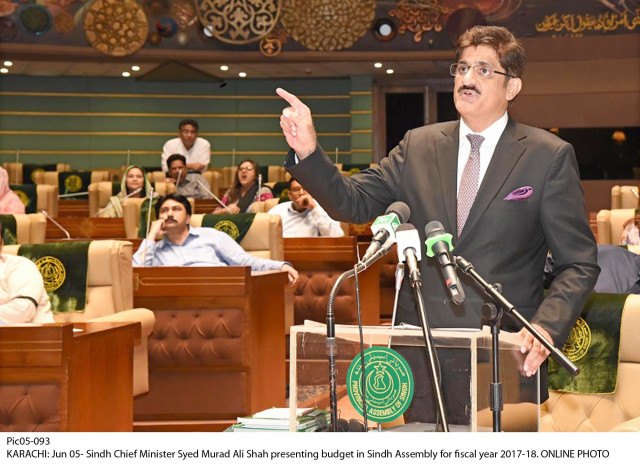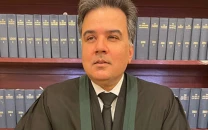Sindh cabinet approves Sindh Accountability Agency Bill 2017
Proposed law to replace NAB Ordinance 1999 will pave way for setting up Sindh Accountability Agency

PHOTO: ONLINE
The cabinet took the decision in a meeting chaired by Sindh Chief Minister Murad Ali Shah at the New Sindh Secretariat on Saturday evening. Earlier, the members discussed Sindh governor’s objections to NAB Ordinance 1999 Sindh Repeal Bill 2017.
The governor, raising the constitutional observations, had called upon the Sindh Assembly to reconsider the law. But the cabinet on Saturday rejected the governor's dissenting note and unanimously approved the draft bill, which was also referred to the provincial assembly.
National Accountability Ordinance repealed by Sindh Assembly
‘Sindh Accountability Agency Bill 2017’ would apply to all officeholders who are performing their functions in connection with affairs and employment of the government funds in Sindh.
Under the new law, Sindh Accountability Agency (SAA) will be set up which will be headed by a chairperson. The agency will be overseen by an Accountability Board, which will include as members the SAA chairperson, Sindh advocate general, SAA prosecutor general, its director general and director investigation. This commission will review the progress of cases of corruption.
The SAA chairperson would be either be a retired judge of the Sindh High Court or a civil servant of grade-21 or above with proven competence, good reputation and high integrity.
The SAA chairperson shall be nominated by a parliamentary committee of the Sindh Assembly. The committee will consist of six members – three each from treasury and opposition – named by the leader of the house and the leader of opposition. The committee shall be headed by Sindh Assembly speaker
The Sindh Enquiries and Anti-Corruption Act, 1991 and Rules made thereunder have also been repealed.
Sindh governor shoots down NAB ordinance repeal bill
All cases pending with the Anti-Corruption Establishment under the repealed act, employees recruited by the Anti-Corruption Establishment and all assets and liabilities, including furniture, fixtures machinery and vehicles shall stand transferred to the agency.
The meeting also decided to establish a Sindh Forensic Science Laboratory in Karachi “with the objective to create a facility for forensic examination of material and documents for presentation before courts, tribunals or other legal authorities.”
The lab would offer different facilities such as audio-visual analysis, computer forensics, crime scene and death scene investigation, DNA and serology, forensic photography, narcotics, toxicology, trace chemistry, polygraph, firearm and tool marks, latent fingerprints, pathology and questioned documents.
The PC-I of the laboratory project has already been approved at an approximate cost of Rs2.7 billion. The project will complete in 30 months. The cabinet also approved ‘the Sindh Forensic Science Agency Act 2017’ for its placement before the Sindh Assembly.
The cabinet also discussed enhancement of quota for disabled persons from 2% to 5%. The cabinet approved the placement of the amendment before the legislature.
The cabinet approved repeal of The Removal From Service (Special Powers) Sindh, Sindh Ordinance 2000. It also discussed The Sindh New Captive Power Plants Subsidy Bill 2017 which has already been passed by the Sindh Assembly. The cabinet referred the bill back to the provincial assembly for reconsideration.
The cabinet discussed the objections raised on the bill by the governor and said a subsidy was being given for specific purpose to reduce load-shedding at local level, where powers plants were installed. The bill is not in contravention of any law and is only meant for the benefit of general public, it added.



















COMMENTS
Comments are moderated and generally will be posted if they are on-topic and not abusive.
For more information, please see our Comments FAQ